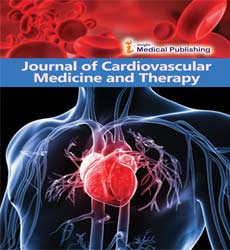Impact of Lifestyle Modifications on Hypertension Management: Evidence-Based Approaches
Julie Simon*
Department of Cardiovascular Medicine, Kanazawa University, Kanazawa 950-8624, Japan
*Corresponding author:
Julie Simon,
Department of Cardiovascular Medicine, Kanazawa University, Kanazawa 950-8624, Japan,
E-mail: Simon.juli@sa3.so-net.ne.jp
Received date: February 01, 2025, Manuscript No. ipcmt-25-20683; Editor assigned date: February 03, 2025, PreQC No. ipcmt-25-20683 (PQ); Reviewed date: February 15, 2025, QC No. ipcmt-25-20683; Revised date: February 22, 2025, Manuscript No. ipcmt-25-20683 (R); Published date: February 28, 2025
Citation: Simon J (2025) Impact of Lifestyle Modifications on Hypertension Management: Evidence-Based Approaches. J Cardiovasc Med Ther Vol.8 No.1:02
Introduction
Hypertension, or high blood pressure, is a leading modifiable risk factor for cardiovascular disease, stroke, chronic kidney disease and premature mortality worldwide. According to global estimates, nearly one in four adults is affected by hypertension, with prevalence rising due to aging populations, urbanization and sedentary lifestyles. Despite the availability of pharmacological therapies, achieving optimal blood pressure control remains a significant challenge, with many patients failing to reach target levels due to non-adherence, side effects and lifestyle-related factors [1]. Lifestyle modifications represent a cornerstone of hypertension management and prevention. These interventions, encompassing dietary adjustments, physical activity, weight management, stress reduction, smoking cessation and moderation of alcohol intake, have consistently demonstrated efficacy in lowering blood pressure and reducing cardiovascular risk. Evidence-based guidelines from organizations such as the American Heart Association (AHA), European Society of Cardiology (ESC) and World Health Organization (WHO) emphasize the integration of lifestyle interventions as first-line strategies, either alone in individuals with elevated blood pressure or in combination with pharmacologic therapy for those with established hypertension.
Description
Dietary interventions are among the most extensively studied and effective lifestyle strategies for hypertension management. The Dietary Approaches to Stop Hypertension (DASH) diet, rich in fruits, vegetables, whole grains, lean proteins and low-fat dairy, while low in saturated fats, cholesterol and sodium, has been shown to significantly reduce systolic and diastolic blood pressure. Randomized controlled trials indicate that adherence to the DASH diet can lower systolic blood pressure by approximately 8â??14 mmHg in hypertensive patients, with additional benefits observed in prehypertensive individuals.
Sodium restriction, independent of dietary patterns, is a critical component of dietary modification, with guidelines recommending intake below 2,300 mg per day and ideally closer to 1,500 mg for optimal blood pressure reduction. Limiting sodium intake attenuates fluid retention, reduces vascular resistance and improves endothelial function [2].
Weight management is another pivotal factor in controlling hypertension. Excess body weight is strongly associated with elevated blood pressure due to mechanisms including increased sympathetic nervous system activity, insulin resistance and alterations in the renin-angiotensin-aldosterone system. Evidence indicates that even modest weight loss of 5â??10% in overweight or obese individuals can lead to meaningful reductions in both systolic and diastolic blood pressure. Combining caloric restriction with regular physical activity enhances weight loss, cardiovascular fitness and metabolic health, contributing to sustained blood pressure control [1]. Physical activity is a cornerstone of non-pharmacologic hypertension management. Aerobic exercises, such as brisk walking, cycling, swimming, or jogging, performed for at least 150 minutes per week, have consistently demonstrated reductions in blood pressure ranging from 4-9 mmHg.
Resistance training, when integrated with aerobic activity, further enhances vascular function and metabolic outcomes. Exercise improves endothelial function, reduces systemic vascular resistance, enhances insulin sensitivity and promotes favorable autonomic regulation, all contributing to blood pressure reduction. Importantly, structured exercise programs can also support weight loss and mental well-being, amplifying the overall cardiovascular benefit [2]. Stress management and psychosocial interventions play a complementary role in blood pressure control.
Chronic psychological stress contributes to hypertension via activation of the hypothalamic-pituitary-adrenal axis and sympathetic nervous system, promoting vascular constriction, inflammation and endothelial dysfunction. Techniques such as mindfulness meditation, yoga, deep breathing exercises, cognitive behavioral therapy and biofeedback have been shown to reduce blood pressure modestly while improving psychological resilience. Integrating stress reduction into routine care supports adherence to other lifestyle interventions and enhances overall cardiovascular health.
Conclusion
Lifestyle modifications represent a fundamental and evidence-based approach to hypertension management, offering substantial benefits in blood pressure reduction, cardiovascular risk mitigation and overall health improvement. Dietary interventions, including adherence to the DASH diet and sodium restriction, combined with weight management, regular physical activity, stress reduction, moderation of alcohol intake and smoking cessation, form a comprehensive framework for non-pharmacologic hypertension control. Clinical evidence demonstrates that these interventions are effective both as primary strategies for individuals with elevated blood pressure and as adjunctive measures for patients receiving pharmacologic therapy. Successful implementation depends on individualized counseling, structured support, patient engagement and integration of digital health and community-based programs to promote adherence. Incorporating lifestyle modifications into routine care empowers patients to take an active role in their cardiovascular health, reduces reliance on medications and contributes to long-term prevention of hypertension-related complications. By emphasizing evidence-based approaches, clinicians and public health practitioners can optimize hypertension management, improve quality of life and reduce the global burden of cardiovascular disease. Lifestyle interventions, therefore, remain an indispensable component of a comprehensive strategy for managing hypertension and promoting cardiovascular health at both individual and population levels.
Acknowledgement
None.
Conflict of Interest
None.
References
Open Access Journals
- Aquaculture & Veterinary Science
- Chemistry & Chemical Sciences
- Clinical Sciences
- Engineering
- General Science
- Genetics & Molecular Biology
- Health Care & Nursing
- Immunology & Microbiology
- Materials Science
- Mathematics & Physics
- Medical Sciences
- Neurology & Psychiatry
- Oncology & Cancer Science
- Pharmaceutical Sciences
